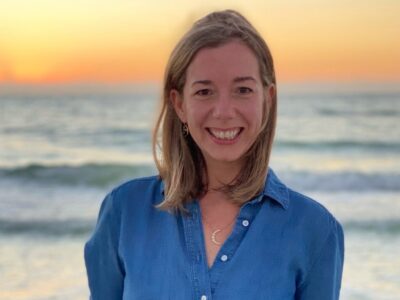The Alumni Spotlight series includes interviews from Earth Institute alumni about their career paths, how they became interested in Earth Institute programs, and any advice that would be useful to current and future students.

Brighton Mukupa Kaoma moved to New York City from his native Zambia to join Columbia’s Environmental Science and Policy program in 2019. But his dedication to learning about the climate crisis, educating others, and protecting vulnerable communities began when he was very young.
He grew up in a small community without access to roads or piped water. On one side of his community, there was a river, and on the other there was an open-pit mine. Brighton’s community was directly affected by sulfuric acid mine runoff, as well as other process waste.
Through conversations with his grandmother, his parents and sisters about their different experiences — for example, with when to plant certain crops — Brighton gained insight into how the local environment was changing over time. He remembers that as early as the age of 10, he was putting together how these changes may be happening. “I saw climate injustices, climate refugees, and challenges related to climate,” he said.
Brighton realized that there was a need to have an important conversation regarding the effects of resource exploitation on communities like his, and radio was the most accessible and inexpensive way to facilitate a discussion highlighting these issues.
At 14 years old, Brighton started a radio program to educate his community about local environmental hazards and climate change. He took the initiative to bring in local professors with expertise relevant to the climate crisis. He also recognized the importance of diverse perspectives and experiences; he made a point of including local women in the discussion on his radio show, as well as bringing children into the conversation to share their own experiences. Brighton’s podcast reached 2 million people per week.

While running the radio show, Brighton was also in school. It was a challenge to manage the show along with keeping up with his coursework and maintaining high grades. He knew that he would not be excused from his academic responsibilities just because he was a radio broadcaster. However, his radio show and his schooling weren’t entirely at odds. Through his research for each episode, Brighton learned new things about science that supplemented his education in school.
Because of his work in radio, Brighton had the opportunity to become a UNICEF child ambassador. In this role, he supported curriculum development for the training of over 1,200 Zambian children as child climate ambassadors through annual climate conferences. He also supported UNICEF in setting up media hubs in under-resourced public schools of Zambia to enhance internet connectivity, social media campaigning, and the digital engagement of young people.


Brighton went on to attend the University of Zambia to focus on environmental science and education. He graduated in December 2017, and then worked at the university as a teaching assistant for a course on climate and gender. The course gave him a deeper understanding and interest in how climate change disproportionally affects girls in Africa and around the world, and the importance of gender-sensitive solutions.
In 2016, World Wildlife Fund International recognized Brighton’s radio work by presenting him with its Global President’s Award for Sustainability. As a result of his numerous leadership recognitions, Brighton had the honor of being invited to Washington D.C. to meet then President Barack Obama.

Brighton found this experience incredibly inspiring and motivating. He felt that President Obama recognized the ability of children and young people to create change. He remembers president Obama saying to him, “You’re young and you’ve accomplished so much. What do you want to do with your life?” Brighton explained that he was passionate about youth empowerment. What better way to contribute to society than working with young leaders? To offer some guidance to Brighton, President Obama suggested what he believed to be the best programs to study sustainability at the graduate level in the U.S. He recommended a few institutions, including Columbia University. Eager to take the president’s advice, Brighton began looking into the MPA in Environmental Science and Policy program. Brighton quickly realized that the MPA-ESP program would give him the best network of sustainability professionals to learn from and advance his goals.
When Brighton joined the program in 2019, he knew that he made the right choice because he found himself learning a great deal about both science and policy. The program provided Brighton with the latitude to develop stronger skills in economics, policy analysis, and environmental science, with guidance from the best educators around. He remembers taking a climatology course in 2019 that was “incredible,” he said. “I think it’s important for any sustainability practitioner to understand the science of climate because they must make the right recommendations to inform sound policies.”
Brighton looks forward to seeing his friends from the program change the world for the better, and he hopes to make a real difference alongside them.
After graduating from the MPA-ESP program, Brighton worked with the World Wildlife Fund’s CEO for Africa as a consultant focused on policy analysis and thought leadership. He worked on technical annual reports and helped communicate the organization’s achievements. WWF’s regional office for Africa oversees over 10 offices in Africa with over 600 staff members.
Next, a member of the staff at Columbia’s Lamont-Doherty Earth Observatory reached out to Brighton to recommend he apply for an open position at the U.N. Sustainable Development Solutions Network as the global youth director. In this position, Brighton could apply his skills that he had gained from his time in the MPA-ESP program to support young entrepreneurs and activists working to implement the U.N.’s sustainable development goals.
Currently, Brighton is serving as the global youth director for the United Nations. It is one of the largest networks of young people supporting young entrepreneurs, young activists, and young sustainability leaders to accelerate sustainability solutions. This support involves bringing in these young leaders to train them and provide them with a network for sustainable development, to create pathways of understanding, and to give young people the skills and resources to take action. Currently 3,700 young people are members of the network. They are doing things like raising awareness, running campaigns, and planting trees, among other activities promoting the U.N.’s sustainability goals. Next month, the network will be launching a year-long fellowship in which young people from over 100 counties identify and work toward sustainability solutions in their cities.
On a day-to-day basis, Brighton spends his time coordinating project leaders who work with teams around the world to advance entrepreneurship and education for sustainable development. At the same time, he is working on fundraising strategies and partnerships across the U.N., and speaking at high-level, global U.N. events to represent young people.
Long term, Brighton would like to continue supporting U.N. efforts in different capacities, specifically addressing financing for the sustainable development goals. He is passionate about understanding how we can focus resources to reduce global hunger, empower women and young people, achieve education for all, and reduce emissions. Brighton would like to be a critical player in achieving these goals, especially for developing countries and underserved communities. He would also like to teach and contribute to the body of knowledge in sustainable development around the world.

To current and prospective MPA-ESP students, Brighton’s advice is to “be open-minded. The program doesn’t only provide you with technical skills to survive in corporate institutions. It also provides you with the space to meet people from diverse social and economic backgrounds, and to make incredible friends. While in this program, you can meet people who change the way that you look at life entirely.” Brighton is also still in touch with many Columbia professors.
Brighton wanted to highlight that “deciding to pursue graduate studies is one of the most important decisions one can make.” He recommended the MPA-ESP program because of the nature of how the program has been designed. “Columbia is an amazing place,” he said. “Being in the program gives you the opportunity to focus on the things that you care most about.” Additionally, “New York City is bubbling!” He said that living in Morningside Heights allowed him to have great experiences, eat amazing food, and really enjoy life while pursuing his studies and goals.
Brighton will be publishing a book this summer about the value of telling stories, highlighting how important hearing each person’s unique story can be, and how stories can change the world. Brighton was able to use his radio program as a platform to tell the stories of others, and he believes that everything that changes in the world will begin with a story. Hopefully that story translates to an idea, which translates to a solution. “Every young person should think about how sustainability effects them irrespective of their profession,” he said. “Storytelling allows us to extend this discussion beyond our professional circles.”
If you’re interested in learning more about the MPA-ESP program, please contact assistant director Pearl Gray (pfg2108@columbia.edu) with any questions or to schedule a campus visit.




Congratulations dear Brighton. This is indeed an amazing journey from humble beginnings. i am ever so proud of your achievements and your accomplishments are well deserved. Keep on inspiring other young people and thank you for representing us so well. God bless you.
Thank you so much Betty for being such a wonderful mentor, and also, an extended ‘parent’ to many of us. You should be proud of yourself for inspiring and drawing the blueprint for supranational institutions to invest in children and youth- like you continue to do with UNICEF.